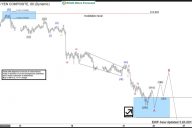
More than half of all American adults have investments in the stock market. Yet the average investor tends to underperform major market indices on timelines ranging from one year to more than two decades. How can this be? Some of this underperformance is due to the fact that many investors just don’t have enough resources to take advantage of good buying opportunities, but by far the largest reason is psychological. We’re our own worst enemies.
Human beings are very good at behaving in ways that ensure their short-term survival, but few have developed the long-term vision and patience necessary to hang on to good investments for the long haul. Many investors undermine themselves by saying things like you’ll see below, which usually focus on short-term gains over long-term success. If you can stop saying these things, you’ll be on your way to success as a long-term investor.
“… tightening into a cup-and-handle …” (or other technical-trading jargon)
I’ve talked to a number of technical traders over the years, and I’m connected to dozens (if not hundreds) on LinkedIn, so this first statement is in no way meant to disrespect trading. However, it’s important to distinguish short-term trading, particularly the sort reliant on technical signals, from long-term investing. The former is a form of speculation that’s rarely connected to business fundamentals, while the latter absolutely depends on understanding those fundamentals, both in the present and for the future.
Technical trading involves a lot of jargon that attempts to find patterns in the randomness of daily stock movements. Humans are so good at finding patterns in things that we often invent them to fit random events, a psychological fallacy called false pattern recognition, or apophenia. It takes a very dedicated mind with a very high tolerance for volatility and risk to be a trader, and most people who try their hand at it will lose money.











No Comments